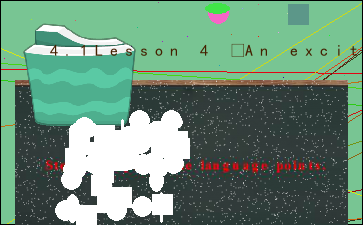4.1Lesson 4 An exciting trip课件
以下为《4.1Lesson 4 An exciting trip课件》的无排版文字预览,完整内容请下载
Lesson 4 An exciting tripTeaching Aims:
1. Read and undersand the whole text.
整体理解课文
2. Remember language points in the text.
熟记语言点
3. Review relevant grammar.
语法复习
4. Finish some exercises.
完成相关练习Step 1: Listen and answer.
Listen to the tape, and answer this question.Why is Tim finding this trip exciting? Because he has never been abroad before.Step 2: Explain the language points.This news is very .
We are very about this news.
1. exciting adj. 令人兴奋的
excited adj. 感到兴奋的excitedexciting同类型的词:interest (interesting interested)
surprise (surprising surprised)
confuse (confusing confused)
disappoint (disappointing disappointed)
exhaust (exhausting exhausted)
embarrass (embarrassing embarrassed) etc.receive a letter from sb. = hear from sb.
收到...的来信
2. receive v. 接受,收到acceptreceivedI a gift from a stranger, but I
didn't it. accept:同意接收(主观上)
receive: 客观的收到3. I have just received a letter from my brother,
Tim.同位语:
一个名词(或短语)对另一个名词进行修饰, 限定
或说明,这个名词(或短语)就是同位语。
同位语与它所补充说明的成分之间用逗号隔开。Mr Wang, my child's teacher, will be visiting us
on Tuesday.
I, the oldest girl in the family, always had to care for the other children.同位语从句:
同位语从句,指的是在复合句中充当同位语的从
句,同位语从句用来对其前面的抽象名词进行解
释说明。引导同位语从句的词语通常有that, whether, what, 内容过长,仅展示头部和尾部部分文字预览,全文请查看图片预览。 question three times already.
4. He __________ (break) two records so far.
5. I?____________ (work)?here?since?I moved? here.has beenhave not caughthave askedhas brokenhave workedHomework:
1. 熟练背诵全文;
2. 复习并整理课文讲解内容至积累本,
巩固知识点记忆;
3. 完成第四课时预习导学和当堂检测。[文章尾部最后300字内容到此结束,中间部分内容请查看底下的图片预览]请点击下方选择您需要的文档下载。
- 四年级英语线上教学知识梳理与整合
- 介词用法内容
- 英语初二上册语法归纳
- Unit-1-Fresh-start练习答案综合教程三
- 英语复习词组
- 新目标九Unit12试题
- 感叹句专项练习及答案
- 第五讲 形容词和副词-备战高考英语一轮复习语法知识框架复习
- XX省春季高考专用:春考全三册语法汇总(考前必备)
- (完整版)小升初感叹句知识讲解及练习
- Unit2知识要点(投影使用)
- 职高英语基础模块上Unit1课件
- 英语冠词用法总结
- 吸尘器供应商中文印尼语简介
以上为《4.1Lesson 4 An exciting trip课件》的无排版文字预览,完整内容请下载
4.1Lesson 4 An exciting trip课件由用户“qinlinkang”分享发布,转载请注明出处